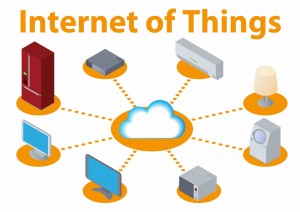 Think of a home that cools the air when you walk in the door, that makes a grocery list for you based on the food you take from the refrigerator, and that turns your sprinkler off and on depending on the local weather reports. This home of the future is now, and it’s based on a concept called the Internet of Things. It’s the basis of houses called “smart homes”: a super-connected network of appliances and systems that run as one smooth process to make your life more comfortable, save energy, and be frugal, all at the same time.
Think of a home that cools the air when you walk in the door, that makes a grocery list for you based on the food you take from the refrigerator, and that turns your sprinkler off and on depending on the local weather reports. This home of the future is now, and it’s based on a concept called the Internet of Things. It’s the basis of houses called “smart homes”: a super-connected network of appliances and systems that run as one smooth process to make your life more comfortable, save energy, and be frugal, all at the same time.
Electrical Costs
Homes with advanced residential electrical systems will eventually base their cost and usage on the time the electricity turns on, as well as the amount of power used. Electricity is more expensive to produce during the middle of a hot summer day than on a fall evening. Electrical usage costs should be based on the actual cost of producing this power, not an average cost over the length of the month. If you’re frugal and only use lights at night when needed and keep your air conditioning usage to a bare minimum, you should be able to reap the benefits of that frugality. With the Internet of Things, a home’s electrical system will be so connected that you’ll see energy savings on a daily basis simply because of the way you use your utilities.
Smart Appliances
The idea of finding energy savings simply by timing your dishwasher and dryer loads may seem too complicated, but with smart technology it will be a basic part of running the appliances. When electrical power is cheaper in the evening or in the middle of the night, large appliances will have settings allowing you to fill them and then pause the action until later in the day. Your clothes and dishes will still be clean tomorrow, but you’ll use much cheaper power for doing the same job. Household chores will no longer be solely the province of someone filling time during an off day. It will be natural for everyone to fill and set machines, since it will be more important to have them run later than to have the work done at the certain time during the day.
Air Conditioning
A good part of energy conservation in south Florida depends on air conditioning usage for a great part of the year. More than any other appliance, the air conditioning unit uses up power at an increasing pace as the year moves forward. The Internet of Things will include smart A/C units and thermostats connected to heat sensors in each room of the house. When the system finds a human body in one room, it can kick on and cool the air selectively to make that person comfortable. Once the residents leave the home for the day, a smart home system will shut down to use a minimum of power, creating energy savings for the duration of the day. Cooling the home later in the day when the residents are home will reduce power usage while still keeping everyone cool and comfortable.
Anticipation
The Internet of Things doesn’t just mean having a toaster and dishwasher that turn themselves off when you’re off to work. It’s an interconnected system that combines smart appliances, an intelligent utility system and a power grid that is responsive to power usage and able to ebb and flow with the environment as well as human usage. Homes with this type of system will notice when people haven’t been in the home for a day or two and will turn off the water heater to save power. It will automatically turn alarms on and off based on when body heat is present or absent in the building, and even email the utility company when power needs to be throttled down to the home when you’re on vacation. The Internet of Things is the use of technology in ways that achieve energy conservation, but it’s also about having a more comfortable and convenient lifestyle.

Recent Comments